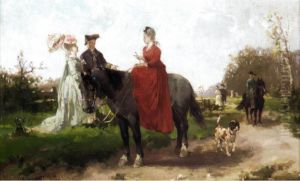Hans Gerhard Hans Buttner / Paintings
Hans Gerhard Hans Buttner was a German artist, born in 1894, whose life and career were dramatically cut short by the events of World War I, leading to his untimely death in 1918 at the age of just 24. Despite his brief career, Buttner's work provides a unique insight into the artistic movements of early 20th-century Germany, reflecting the turbulent times in which he lived. Unfortunately, due to the brevity of his career and the era in which he worked, detailed records of Buttner's life and oeuvre are scarce, and he remains a lesser-known figure in the art historical canon.
Buttner's artistic output, though limited by his short life, was influenced by the major art movements of the time, including Expressionism and early Modernism. His work often explored themes of human suffering, introspection, and the chaos of war, subjects that were intensely personal and reflective of the broader societal turmoil of the period. Like many artists of his generation, the experience of war deeply impacted Buttner's artistic vision, leading to works that are marked by a sense of urgency and existential dread.
Despite the scarcity of surviving works and the limited documentation of his life, Buttner's contributions to the art world are valued for their emotional intensity and historical significance. His paintings and sketches offer a poignant glimpse into the mind of a young artist grappling with the devastation of war and the fleeting nature of life. Today, Hans Gerhard Hans Buttner is remembered not just for his artistic talent, but also as a symbol of the tragic loss of potential caused by the Great War, representing a generation of artists whose lives and careers were irreversibly altered by conflict.

